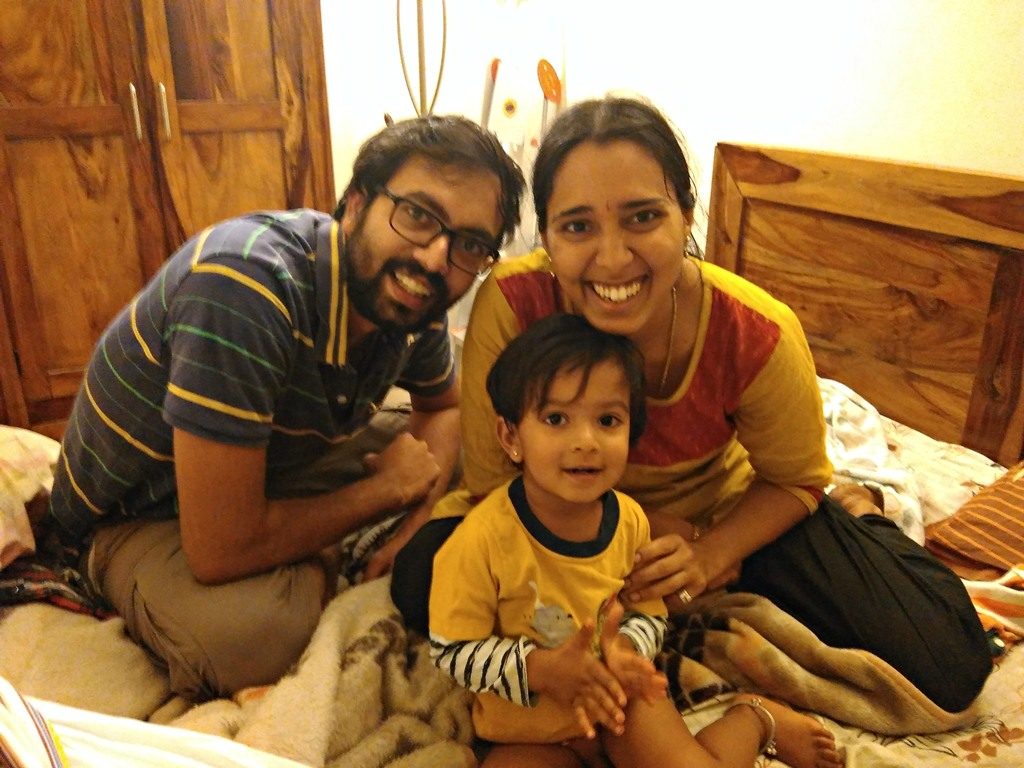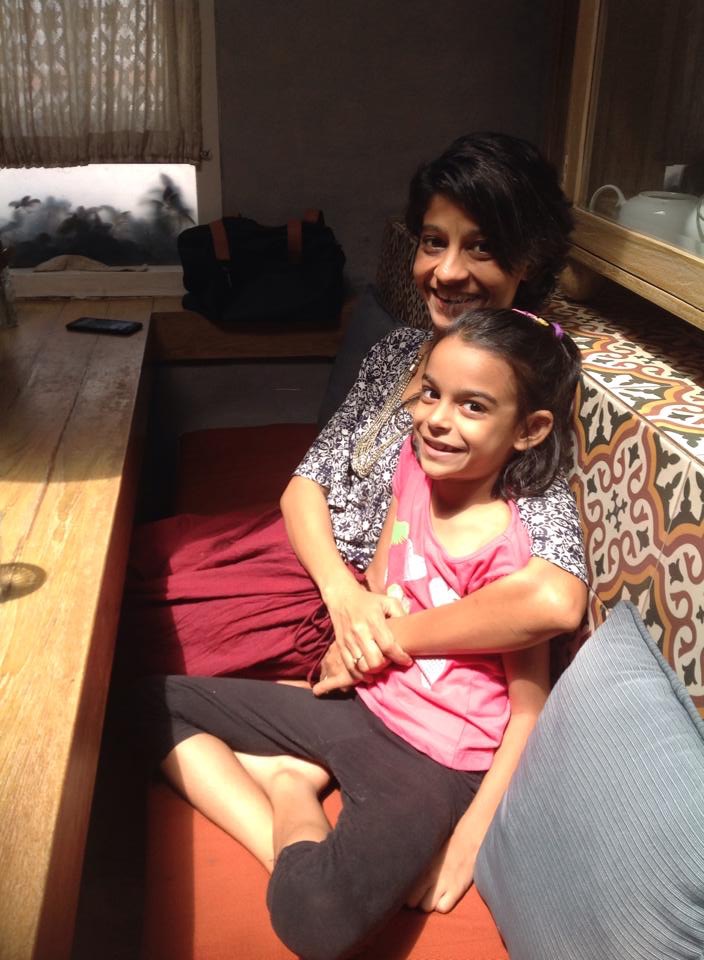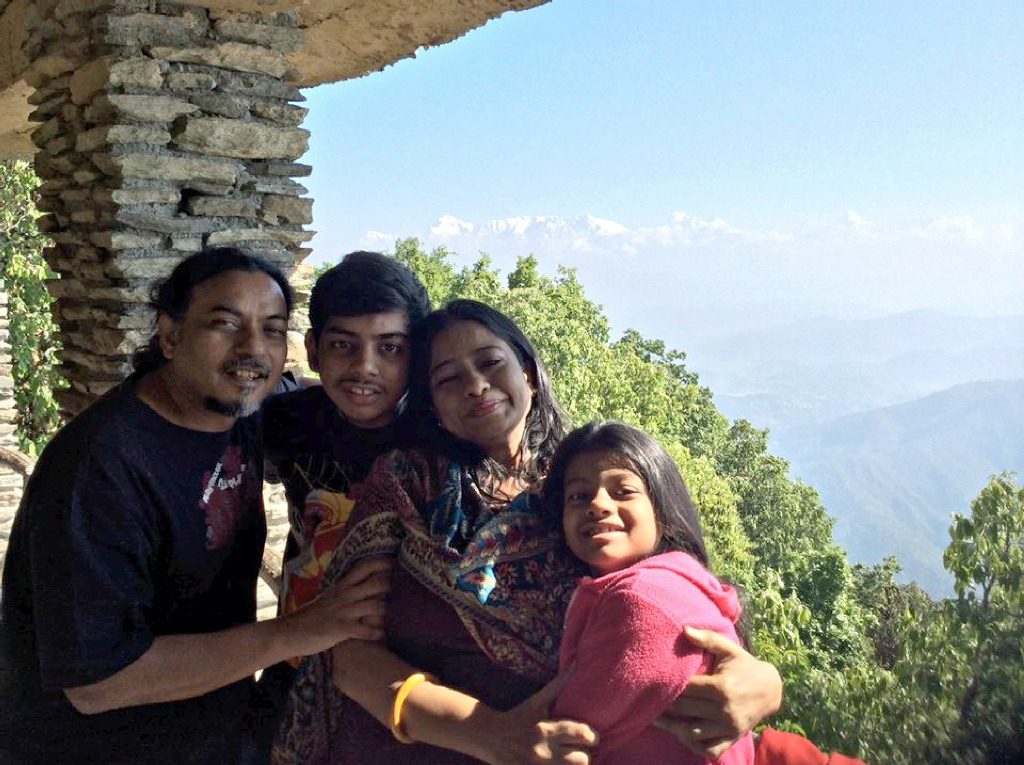“ORGANIC IS GOOD. JUNK FOOD IS BAD”: INDIAN PARENTS TEACH THEIR KIDS
By Athar P (with inputs from Future Market Insights and its report, Organic Baby Food Market – BRIC Industry Analysis and Opportunity Assessment 2015-2020)
Visit ORGANIC SHOP by Pure & Eco India
A McDonald’s or Taco Bell outlet is where you’d find Meenalochani Srinivasan and spouse on a weekend a few years ago, but now you are likely to spot the couple at a designated pickup location, eagerly awaiting their organic food delivery from Jivabhumi, a local organic food provider.
While food and nutritional safety never populated her thoughts before, 29-year-old Srinivasan, a former software engineer residing in Bengaluru, found herself fraught with worry when she learnt she was going to be a mother. “I wanted, with all my heart, to provide my child with the healthiest foods possible and so I started researching online. That’s when I discovered organics,” she says.

Meenalochani Srinivasan with family
“I wanted, with all my heart, to provide my child with the healthiest foods possible and so I started researching online. That’s when I discovered organics”
Meenalochani Srinivasan, mother to 2-year old son, Bengaluru
Now, with her son all of two, Srinivasan and family have become “permanent” converts. Having gradually morphed her kitchen into an all-organic one, she is currently in the process of upgrading to organic bath and beauty products for the family and natural cleaning agents for the home. The Srinivasans have placed an embargo upon all things unhealthy, non organic and processed, and to appease old cravings for junk foods, they turn to home made organic options such as millet pizzas, organic sweet potato fries and jaggery based organic wheat cookies.
Srinivasan continually builds her knowledgebase on organics by frequently logging on to organic food discussion platforms online and is an active member of the public Facebook group, ‘Organic Consumers (Bangalore)’, where likeminded people have formed a community to share and source information about organic foods, practices and products.
“Over the last five to six years, we have gradually shifted to consumption of naturally produced, chemical free and safe food. We normally stick to fresh home cooked food—no restaurant or packaged meals for us. My daughter, being a youngster and also due to peer pressure, may eat the odd junk or packaged snack, but even then she is very conscious and aware it is bad”
Dr Supriya Sardana, mother to 11-year-old daughter, Noida
Growing Organic Community of Parents
The Srinivasans are not isolated in their adoption of organic foods and products. They constitute the proverbial tip of a rapidly growing community of concerned, conscious and mindful parents, who are leaning towards organic foods and products due to a variety of reasons. Some want to help farmers, the soil and the planet, while others got interested after attending an organic trade show, had relatives set up businesses in the field or because they talked to fellow parents, who swore by the virtues of organics. Print and social media have, in recent years frequently exposed the ill effects of pesticides, while also spreading awareness of the benefits of organic foods. Concerned parents have been taking note, spreading the word and teaching their children ‘good food’ from ‘bad food’.
“Instances of illnesses in children and lifestyle disorders in adults are the primary reason why parents are becoming increasingly aware of organics. There is a niche in our community, which is very vocal about using organic products and sustainable alternatives and it appears to be growing”
Naiyya Saggi, Founder, BabyChakra
In Noida, it has been half a decade since 41-year-old dermatologist, Dr Supriya Sardana, adopted the conscious life, having brought up her 11-year-old daughter on a healthy dose of organic foods and eco conscious values. “Over the last five to six years we have gradually shifted to consumption of naturally produced, chemical free and safe food. We normally stick to fresh home cooked food—no restaurant or packaged meals for us. My daughter, being a youngster and also due to peer pressure, may eat the odd junk or packaged snack, but even then she is very conscious and aware that it is bad,” says Sardana.
Also conscious of ‘bad foods’ is seven-year-old Sia, daughter to Shabia Walia, a 42-year-old Mumbai based entrepreneur, who aspires to exemplify healthy living for her child. “We have led by example and my daughter is well aware of what is good for her foodwise. We do allow cheat days when she can indulge in moderate portions of fast food but largely, she happily adheres to the organic home-food-only policy,” says Walia.

Shabi Walia with daughter, Sia
The Walias have incorporated organic-only ingredients into their kitchen and use bath and body products from Shabia’s own natural skincare range, ‘Wild Earth’. They have also boycotted canned foods and sodas.
Shailja Shaily, another Mumbai resident, a children’s life skills trainer, “went organic” six years ago. Shaily, whose family comprises her husband and two children (11-year-old girl, 17-year-old boy), lives by the tenet, “Consume less, but consume better.” The family subscribes to organic staples, farm fresh milk, and organic fruits and vegetables on a regular basis.

Shailja Shaily with family
Northwards, in Haryana’s Gurugram, Geetika Ribeiro, mother to 13-year-old fraternal twins, Ashlyn and Ashmit, is a new convert to organic foods. For her, interest developed after attending an exhibition on organic and natural foods in Dubai.

Geetika Ribeiro with her twins, Ashlyn and Ashmit
Another Bengaluru resident, Jyotsna, a branding and travel consultant, became intrigued when her sister founded an organic food business, HappyHealthyMe Organics. While everything she purchases for her home is organic (including bath and cleaning products), her 16-month old son is fed organic raw honey, probiotic ghee, mashed organic vegetables and free range eggs on a daily basis. According to her, switching to organic has been a positive move for the family, as it has encouraged them to eat more at home, and allowed them to become re-acquainted with local, regional produce and ingredients such as millets and Indian gooseberry.
Jyotsna looks forward to raising her son on a solid foundation of organic foods. “I’m hoping to feed my child healthy and tasty organic food so he can grow up to be a happy, healthy individual. He is too young right now, but will soon be able to decide on his own if McDonald’s is good for him or not. I don’t eat fast food so why should he?” she asks rhetorically.
The Price to Pay
Parents switching over to organic foods opine a few hundred Rupees extra is a pittance to pay for their child’s long term health and wellbeing. Srinivasan says her child is in stellar health and her family’s visits to the doctor have come to a naught; she strongly believes going organic may have contributed to their robust health. “Yes, organic foods and certain other organic products are priced a bit higher than conventional items. But that should not stop people from going organic because it is worth every extra penny spent,” she says.
“Organic food is free of pesticides, which cause many problems, especially in children. Long term intake of pesticides and that too, from an early age, can result in certain cancers. We usually recommend that they do not feed their kids foods containing pesticides or chemical fertilisers”
Dr Nitin Verma, Principal Consultant, Paediatrics, Max Smart Super Specialty Hospital, New Delhi
Sardana points out the extra cost of purchasing organic is not really additional and can be easily evened out. “Agreed, the cost of organics is higher but once one adopts an eco conscious lifestyle, the cost of living and one’s carbon footprint goes down because you are not eating out very weekend, nor buying sodas and take out, and all that palaver. So, it’s a win-win in the end, both for me and my planet,” she says.
To Walia and Jyotsna consuming organic is analogous to making an investment; they echo a common opinion: “Honestly, the price difference is not as much as the naysayers may like people to believe if you factor in the junk you are not spending on anymore. Also, it must be factored in how much you’re saving in future medical bills. It makes sense to invest in the food we eat now, versus paying a volley of medical bills later! We invest in hefty mediclaims to tide us over when we fall ill, why not invest in healthy foods so that we don’t?”
Food Safety Fears Driving Upward Trend towards Organic
With growing awareness of food safety issues, new parents are flocking to paediatricians for advice. Dr NitinVerma, principal consultant, Paediatrics, Max Smart Super Speciality Hospital, New Delhi, believes consuming organic food makes a huge difference to the health of a child. “Organic food is free of pesticides, which cause many problems, especially in children. Long term intake of pesticides and that too, from an early age, can result in certain cancers,” he warns.
He shares concerned parents are increasingly asking doctors questions regarding the quality of food and seek advice on the kinds of food their young should consume. “We usually recommend that they do not feed their kids foods containing pesticides or chemical fertilisers,” says Verma.
At BabyChakra, India’s largest social networking site and knowledge resource centre for young mothers and those expecting, as many as 500,000 women log in every month to discuss infant-related issues, share helpful tips and dole out much needed advice, peer to peer. Talk often turns to food safety and organic foods. “Instances of illnesses in children and lifestyle disorders in adults are the primary reason why parents are becoming increasingly aware of organics. There is a niche in our community, which is very vocal about using organic products and sustainable alternatives and it appears to be growing,” informs Naiyya Saggi, founder of the company.
Not surprisingly, the organic baby food market is on a journey upwards. As per a report titled, ‘Organic Baby Food Market – BRIC Industry Analysis and Opportunity Assessment 2015-2020’ by Future Market Insights (FMI), a London based research firm, at the heart of the uptick in organic baby food sales is an emotional and visceral desire to feed healthy and nutritional food to children. This, combined with easy availability of affordable products, has contributed to driving demand for organic baby food.
According to Pratima Maske, senior consultant, food and beverage, FMI, the organic baby food market in India and, in fact, across all BRICS (Brazil, Russia, India, China and South Africa) nations will grow at 20 percent CAGR through 2020 and is estimated to reach US$ 3.52 bn within the same duration (across BRICS). Furthermore, within the organic baby food category, prepared organic foods are the highest selling product type, followed by milk formula.
Green is Good
The growing legion of conscious parents are not only opting for organic foods but are also adopting eco friendly practices in other areas of their lives. Verhaen Khanna, founder of the New Delhi Nature Society (NDNS) informs, parents are wary of the digital age and the negative impact it could have if children stopped interacting with the outdoors. NDNS’ ‘Digital Detox’ weekends have become quite popular with families with children, as the workshop makes devices verboten and guests get to camp out on a farm in the lap of nature. “We also offer a programme called ‘Greenzones of Delhi’, in which we guide attendees through the greenest places in Delhi, identifying birds, butterflies and plants along the way,” says Khanna.
While in the act of embracing organics, along the way, Srinivasan and family evolved eco consciously, and are now not only concerned about food safety but also the environment. “We are very conscious about issues such as water conservation and waste segregation. That’s why we use only cloth diapers for our little one and even I use menstrual cups instead of sanitary napkins. We also compost at home to do our bit for the environment,” says Srinivasan.
Sardana’s adoption of eco practices also runs deeper than organic foods. Shunning commercial tooth paste as it contains SLS (sodium lauryl sulphate), she uses natural teeth cleaning solutions instead and cleans her home with home-made natural concoctions made from decomposed orange peels and jaggery. Mother and daughter bond over composting and organic gardening workshops. Sardana educates her daughter on the ills of pesticides, and the family visits organic haats to shop for organic fare and the occasional lunch outing—organic, of course. “For us, the word ‘organic’ stands for a way of life committed to nature and the environment where preservation of our natural resources and the three principles of reduce, reuse and recycle form the foundation,” she explains.
The Walias, Shailys, and Ribeiros also teach their children similar ethics and the latter have imbibed these values. The Ribeiro children use mostly recycled items and have outcasted all the plastic bags in their home, replacing them with cloth or jute ones. They participate in planting drives, and are currently involved in a composting pit project.
As for Jyotsna, her son is too young but she plans to instil green values early on. “I would like him to grow up earning some good karma and treating the earth with care and kindness,” she says.



Leave a Reply